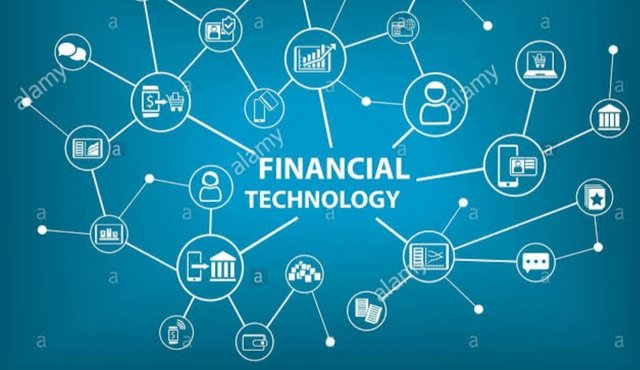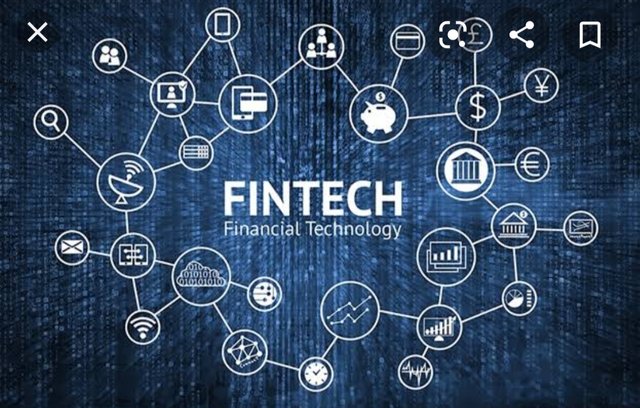Financial Technology (What is Fin Tech and how it works)
What Is FinTech?
FinTech or financial technology refers to the new solutions which
demonstrate innovation in the development of applications, pro-
cesses, products or business models in the financial services industry
using technology. FinTech should have four features. They need to
be highly innovative, pioneering, disruptive and customer-focused.
Technology will include the use of artificial intelligence (AI), big
data, computational power, Internet of Things (IoT) or others. These
solutions can be differentiated in at least five areas by customer
segments like financial services or products built upon technology
in the banking and insurance
 src
src
Role of Fin Tech
Financial Technologies will play a significant role in redefining
finance. First, business costs (capital adequacy requirements and
compliance) are rising for traditional financial institutions. Second,
with financial technology, business costs can be lowered to serve
a large segment of those not currently served by the financial
institutions (Bottom of the Pyramid or BoP). Finally, serving the
unbanked and underbanked or BoP (known as financial inclusion)
can be sustainable FinTech business with scalable growth potential.
Lower margin businesses like microfinance and micro-insurance
will become not only viable but profitable. Additional services such
as credit rating, e-commerce, O2O (Online–Offline), LBS (Location
Based Services) can enhance stickiness and profitability. Consumers
will be attracted by the low costs and convenience that these
new technologies will bring. Traditional financial institutions with
substantial assets and significant fixed costs will be disrupted due toSocial,Economic and Financial Inclusion• Light Regula-on or Compliance Is Not Necessary.
 src
src
Why Use FinTech?
Consumers choose these FinTech institutions instead of trusted
banks for many reasons. They include lower fees and better rates,
lower thresholds for investments, lower thresholds for loans, ease of
use and convenience. Some have argued that as regulations catch up with the FinTech companies, these advantages will disappear.
Others have argued that the new FinTech business models are more
cost effective and therefore these advantages will stay.
The banking sector is plagued by a risk adverse culture, dom-
inated by amply staffed regulatory departments and a financial
control ethos. None of these characteristics screams innovation or
disruption. While the old bank culture needs to change, FinTech
companies are running ahead to innovate, explore and recalibrate
their offerings rapidly. User data as new money implies that data
availability as extremely valuable. Apps that have high user commitment or access to a part of a community have high switching costs,
are more customer sticky and collect richer data. Digital servicesor apps that have huge captive user bases can generate enormousamounts of valuable data.
 src
src
Before plumbing deeper into the FinTech paradigm as non-bank
as a start to the evolution of new banking services .
 src
src
Conclusion
There are various types of products offered by the "Fintech" facility. Of coursethese facilities can have a huge impact on the lifestyle of all walks of life. Among thefacilities offered by this "Fintech" are as a component of payment, investment,financial planning, financing, financial research and as a comparison of financialproducts.Banking institutions can provide better services if they receive "Fintech" withopen minds, collaborating and investing in "Fintech" startup firms. Banks shouldestablish a "Fintech" branch that is in line with the latest technology. With this theycan adapt and face the challenges and risks of "Fintech" better, faster and to remaincompetitive. Not only banking institutions will use "Fintech", even big companiesfrom the property and accounting industry will also start investing in "Fintech" firms.The "Fintech" revolution has a positive impact on the country's work andfinancial sector in terms of opening firms and new talent search in this fast growingindustry. The biggest beneficiaries are financial services customers that make it easierfor them to get better products at reasonable prices. Therefore, it is important forgovernment regulatory agencies to be prepared to address the risks that will come forthe stability and economic development of the country. src
Your posts are always unique and thanks for sharing this with us.
You have been upvoted by cryptokannon, Steem Greeters from STEEM POD Project and we are voting with the Steemit Community Curator @steemcurator03 account to support the newcomers coming into steemit.
Follow @steemitblog for the latest update on Steem Community and come join our #thediarygame Season 2 you can get steem for commenting too with our #onepercent
Steem on!
Hello friend, very good explanation, the truth is that technology today encompasses many things that is impossible to know everything, I did not know this term so it is good to learn something else today. Banks are certainly becoming a thing of the past, compared to other options they have many disadvantages, or so I see it.
@tipu curate
Upvoted 👌 (Mana: 0/20) Passive income with @tipU :)
"The New FinTech is gaining momentum. Registration of fintech companies is gradually receding into the background. The once-unknown RegTech is now one of the most in-demand technologies. But what is RegTech? Read the article FinTech And RegTech In A Nutshell: What's The Difference? https://geniusee.com/single-blog/fintech-and-regtech-in-a-nutshell and you'll see why it gets so much attention.